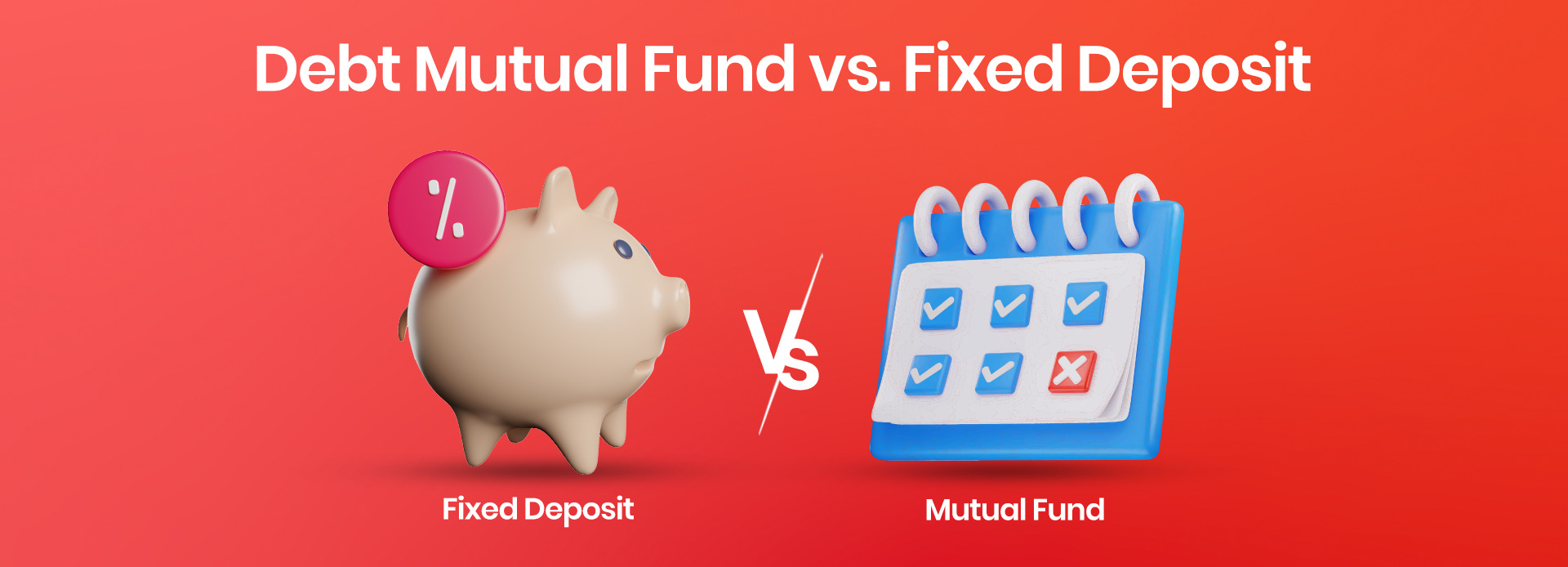
Debt Fund Vs Fixed Deposit (FD) - Which Is Better?
26 June 2024 | By INDIE
With major focus on investments and savings in current times, individuals are in constant search of various options for parking their excess funds. A highlighted trend is that money should make money and that one should not be solely dependent on their salary. Read in detail about two of the most discussed investment options – Debt Mutual Fund Vs Fixed Deposit.
A Debt Mutual Fund is a mutual fund scheme that invests in securities that generates fixed income, such as corporate and government bonds, treasury bills, and other money market instruments. It is also called a Bond Fund or Income Fund. Debt Mutual funds offer capital appreciation on the investment and fixed-interest income.
Fixed Deposit is the most traditional and trustworthy instrument of investment, and many individuals have used it over the years. It provides a fixed rate of income and an assured return of the principal amount after the end of the decided tenure.
Also read: Is Fixed Deposit A Good Investment
In current times, individuals wish to widen their investment horizons and are better prepared to take risks. However, there is no single winner in the comparison of Debt Funds vs FDs as the answers varies from individual to individual. There are many factors come into play when deciding on an investment product such as:
Returns
Fixed Deposit offers a fixed rate of interest for the entire period. The return on the Debt Fund depends upon the performance of the assets within the fund.
Risk
The risk involved in FD is minimal as funds are secured by banks. However, Debt Funds carry various kinds of risk, majorly credit risk. Credit risk is the risk of the issuer defaulting on the repayment of investors’ principal and interest. A smart and efficient fund manager will minimize this risk by putting the funds in AAA-rated securities, which are known to perform well and provide good returns.
Duration
Fixed Deposits have a pre-defined tenure, and prior withdrawals attract penalties. In the case of Debt Mutual Funds, you can exit after a lock-in period.
Investment
The nature of investment in debt mutual funds is diverse, and the fund manager will make investments that are aligned with your financial goals and visions. Fixed Deposits do not offer such diversification.
Investment cost
No cost is incurred when creating a fixed deposit account. However, debt funds incur a recurring expense depending on the type and nature of the fund and portfolio.
Taxation
As per the amendment in the Finance Bill on 1st April 2023, the tax benefits on long-term mutual funds have been eliminated. Due to this, Debt Mutual Funds and Fixed Deposits are at par. The interest from both is now taxable according to a person’s applicable tax slab. In the case of Fixed Deposits, TDS is also deducted.
Professional expertise
A Debt Fund Manager, generally an Asset Management Company, will invest your funds after understanding your financial plan and goals. This helps minimize risk and gain maximum returns by investing in assets that are in line with your needs.
Verdict
Fixed Deposits provide a higher visibility on returns as the amount of maturity is already known to the investors. FD interest rates are generally fixed and are not affected by market performance. It is better suited for investors who do not like to take risks and are not looking to diversify their portfolios. Many investors diligently go through their investments and reinvest even the interest they earn. In other cases, some investors lose on this compounding benefit.
Investors should take a rounded approach, examining various factors such as the fund involved, liquidity, risks, and return on investment rather than relying on only one factor. One of the main considerations should be whether or not the expected returns align with your financial requirements and whether or not the initial investment amount matches your current financial position.
Disclaimer: The information provided in this article is generic and for informational purposes only. It is not a substitute for specific advice in your circumstances. Hence, you are advised to consult your financial advisor before making any financial decision. IndusInd Bank Limited (IBL) does not influence the views of the author in any way. IBL and the author shall not be responsible for any direct/indirect loss or liability incurred by the reader for making any financial decisions based on the contents and information.




